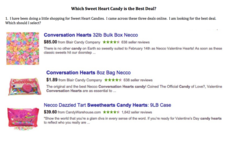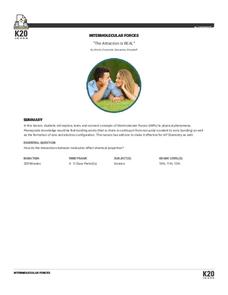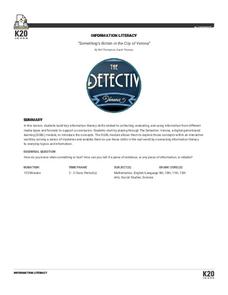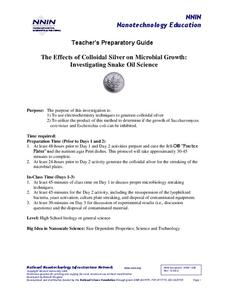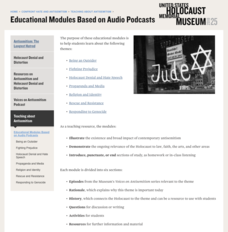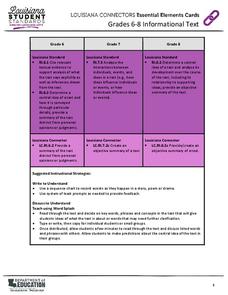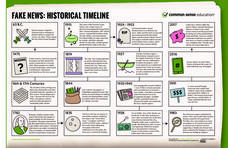Yummy Math
Which Sweet Heart Candy Is the Best Deal?
Get the most Valentine's candy for your money with a fun math activity! After examining three deals for buying candy hearts in bulk, young mathematicians decide which deal is the best and use bar graphs to demonstrate their claim. They...
National Endowment for the Humanities
Upton Sinclair, Theodore Roosevelt, and Harvey W. Wiley
Though Upton Sinclair's novel The Jungle shocked the American public into a thorough examination of the meat-packing industry, the author was disappointed that his book's main argument—the exploitation of American immigrants—was not part...
K20 LEARN
The Attraction is REAL
How attractive is your intermolecular forces lesson plan? Draw your class in with an activity that includes research, presentation, and demonstrations. Chemistry scholars work together to create claims about the each intermolecular...
K20 LEARN
Something's Rotten In The City Of Verona: Information Literacy
Data is a powerful tool that your class can use for both good and evil! Help your classes become knowledgeable consumers of information through a game-based exploration. Learners examine a method of determining the reliability of a...
K20 LEARN
The Parched Plains: Weather And Climate
How do meteorologists differentiate between droughts and dry spells? Introduce the concepts of weather forecasting and prediction with an insightful research-based lesson from the K20 series. Partners synthesize individual research from...
National Nanotechnology Infrastructure Network
The Effects of Colloidal Silver on Microbial Growth: Investigating Snake Oil Science
Can your classes solve the problem of the smelly sweat sock? Young scientists complete a lab investigation that begins by using electrochemistry to generate colloidal silver. They use their solutions to test the rate of microbial growth...
101 Questions
Candle Eyes
Candlelight is in the eye of the distant beholder. Scholars first watch a video clip of a commercial claiming that the human eye can see candlelight from 10 miles away. They use this information to calculate how far we can see...
101 Questions
Brita
It's hard to envision what 39 billion plastic bottles look like. Brita claims that the US uses that number of plastic bottles each year! If that's not enough to get your attention, figure out how many times 39 billion water bottles can...
US Holocaust Museum
Educational Modules Based on Audio Podcasts
Imagine hearing someone claim an event like the Holocaust never happened. Pupils use audio podcasts and reading passages to dive into the lives of those impacted by the Holocaust of World War II. Using the information they gather, class...
University of North Carolina
Statistics
Let's see you back it up! As shown in the 18th handout in the Writing the Paper series of 24 lessons from UNC, statistics help form an effective argument. The handout discusses how to analyze a source and break down the data to ensure it...
Annenberg Foundation
Evaluating Evidence
Was the Civil War fought only due to slavery? Using an interactive web tool, scholars investigate the four main causes of the Civil War. Gathering evidence and data to support their claims, they present a final statistical breakdown...
New York State Education Department
English Language Arts Examination: June 2017
Plants prefer classical music to rock and roll. That's one of the claims in an informational passage that makes up part of a set of standardized assessment questions. The set is part of a larger collection of English language arts tests...
Louisiana Department of Education
Essential Elements Cards
Use essential elements cards to help lesson plan! Each card contains an informational text common core standard for grade levels six through eight and suggestions for activities and supports. Cards address skills such as citing textual...
Common Sense Media
Fake News: Historical Timeline
In 1874, The New York Herald falsely claimed that several animals escaped from the Central Park Zoo, and panic ensued. Using the helpful infographic, pupils discover more instances of fake news throughout history, from as far back as 63...
Reed Novel Studies
To Kill a Mockingbird: Novel Study
Edgar Rice Burroughs was an American fiction writer whose biggest claim to fame was the creation of Tarzan. Using the novel study for Harper Lee's beloved novel, To Kill a Mockingbird, pupils research and list facts about him or another...
National Constitution Center
AP English Language—Argument
All things are subject to interpretation ... and that includes the Bill of Rights. Scholars work through activities to analyze and consider various interpretations and perspectives of the rights listed in the Constitution. They complete...
College Board
2007 AP® English Language and Composition Free-Response Questions Form B
Do museums offer eyes into the past? Scholars synthesize sources to make a claim in an essay about the importance each museum artifact deserves. Pupils also write to analyze journalist level of ethics as well as a speech by Wendell...
Newsela
Understanding "A Long Walk to Water"
What is the secret to success? Scholars use close reading of a variety of articles to determine characteristics of people that overcame hardships to become successful. While reading, pupils annotate their copies, make claims, and...
College Board
2002 AP® English Language and Composition Free-Response Questions
It is not what you say but how you say it. Scholars use an essay prompt from the 2002 AP® English Language and Composition Free-Response Questions to analyze how an author uses language to describe her past. They also support or argue a...
EngageNY
Grade 10 ELA Module 3: Unit 3, Lesson 6
And that's a wrap! Scholars create their concluding statement drafts by examining model text with exemplar conclusions. In pairs, they discuss how transitional words and phrases add to sentence structure and consider how their concluding...
EngageNY
Grade 10 ELA Module 4: Unit 3, Lesson 5
Would Machiavelli consider Macbeth a successful ruler? Scholars ponder the intriguing question, demonstrating their knowledge of Shakespeare's Macbeth and Machiavelli's The Prince. They collaborate with peers to share their opinions,...
EngageNY
Connecting the Universal Refugee Experience of Fleeing and Finding Home to the Title of the Novel Inside Out & Back Again
What does it mean to turn inside out? Using the resource, scholars begin planning their end-of-unit assessment essays. They complete two graphic organizers to form claims about how refugees turn "inside out" and "back again."
EngageNY
The Authorship of Shakespeare: “The Shakespeare Shakedown”
Pupils conduct a close reading of "The Shakespeare Shakedown" by Simon Schama, and identify evidence the author uses to support his claims. Finally, they discuss and answer text-dependent questions before completing a Quick Write about...
EngageNY
End of Unit 2 Assessment, Part 1: Drafting The Argument Essay
Scholars write the draft of their essays about Atticus's decision to defend Tom Robinson in Harper Lee's novel To Kill a Mockingbird. They support their claims with reasons, details, and quotes from the novel.
Other popular searches
- Land Claims
- Advertising Claims
- Insurance Claims
- Aboriginal Land Claims
- Mapping Insurance Claims
- Scientific Claims
- Aboriginal Land Claims In
- Health Claims
- Canadian Native Land Claims
- Native American Land Claims
- Medical Product Claims
- Claims in Arguments


